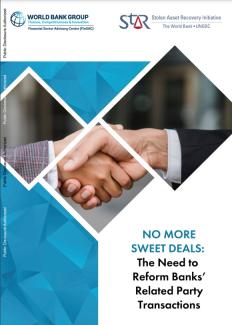
In banking, transactions with related parties (RPTs) refer to financial transactions, including loans, investments, guarantees, or other agreements, conducted between a bank and its related parties (RPs). Despite governments’ and standard setting bodies’ efforts to curtail the issue over the last two decades, recent examples of abusive RPTs abound, both in emerging and advanced economies. Abusive RPTs stem from various root causes, including weaknesses in the legal, regulatory, or corporate governance frameworks of banks and power imbalances within their decision-making processes. Fieldwork conducted by the World Bank for the purpose of this paper also reveals concerning patterns of abuse in RPTs due to multiple regulatory and supervisory loopholes. These findings suggest that the issue of RPTs is not receiving the attention it deserves. It became overshadowed by the post-global financial crisis regulatory agenda, focused on capital and liquidity, and then by the COVID-19 pandemic. Crises connected to undisclosed RPTs that have affected financial stability or put a high burden on taxpayers clearly indicate an urgent need for a fundamental change in the approach toward RPTs. Interviews conducted during this study showed that some countries have responded to the crises by engaging in significant transformations of their legal frameworks, introducing tools, cooperation models, and supervisory processes to protect their economies from suffering similar consequences in the future. These initiatives are welcome, but there is more to be done at several levels. To address these problems, this paper presents a comprehensive set of recommendations. Regulators are urged to develop and enforce robust regulations specifically tailored to RPTs, aligning them with international standards and best practices. Supervisors should enhance their oversight mechanisms and adopt a risk-based approach to monitor RPTs, with increased intervention powers when abuses are detected. Banks themselves play a crucial role in mitigating risks and should strengthen their corporate governance frameworks, establish clear policies and procedures for managing RPTs, and enhance internal controls and reporting systems. Standards-setting bodies are encouraged to expand the definitions of RPs and their transactions, strengthen supervisory reporting requirements, and issue guidance on RPTs.